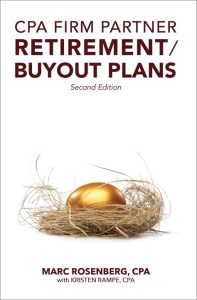Is Paying Capital + Goodwill To Retiring Partners Double-Dipping?
We often get questions from readers of our books related to the practice management topics that are important but unfamiliar for practitioners. Below is a question we’ve heard more than once on valuing the goodwill for a partner buyout, and our thoughts.
I’m a partner with a local firm. I have been reading your book CPA Firm Partner Retirement/Buyout Plans. We have implemented several of the books’ recommendations.
I’m curious about one question regarding the worth of a CPA firm. Currently, we pay capital and goodwill to retiring partners. The capital is the amount of the partner’s capital account and the goodwill is based on the partner’s share of the value the goodwill, which we value at 80% of revenue.
When we typically do other valuations of businesses and value them based on a multiple of earnings, it is assumed they have the necessary working capital in place to generate those earnings. So one would say if I’m going to pay you for that earnings stream then the working capital is part of the purchase price already. Therefore, if you value a CPA firm at 80% of revenue and then pay for the retiring partner’s capital, are you effectively double-dipping on the buy-out?
ROSENBERG RESPONSE:
Thanks for taking the time to write to me. This is my favorite thing to do – responding to emails like yours.
The only business I know is CPA firms. In CPA firms, the working capital has nothing to do with generating future revenues and profits. What generates future revenue and profit is the partners getting new clients, giving world-class service while performing their work expertly, all of which enables firms to transform their clients into annuity relationships. They do this every day. WIP and A/R are converted to cash so quickly at CPA firms that it generates the working capital needed on a current basis to pay staff comp and overhead expenses without borrowing money.
Our book, CPA Firm Partner Retirement / Buyout Plans is a must-read for firms that either need to revise and update their existing plans or need to write a new agreement. The book addresses ►what CPA firms are worth ►what partners must do to get their buyout money ►how to value a firm’s goodwill ►the acid test of a well-conceived retirement plan ►6 methods of determining an individual partner’s buyout ►vesting ►notice and client transition requirements ►mandatory retirement ►non-compete and non-solicitation covenant ►how to prevent your plan from becoming a Ponzi scheme and other issues.
Capital (mainly WIP, A/R and cash) is simply the accrual basis income that has yet to be collected.
Paying one’s capital account in addition to goodwill is not double-dipping because:
- It is the accrual basis profits of sales made in the past.
- Working capital has nothing to do with generating future revenue and profits.
- This is the key to why it’s not double-dipping: Assume a $5M firm with $1M of accrual basis capital. The firm sells to a buyer for one times revenue or $5M. Buyers never purchase the balance sheet of sellers; instead, the sellers retain it for themselves and convert it to cash after the sale. So, when the payout period for the purchase price is completed, the seller will have redeemed its own capital for $1M and received $5M in goodwill payments from the buyer. So the total received by the seller from the sale of their firm is $6M. That’s not double-dipping.
QUESTION – PART 2:
Some of my pre-retirement partners are worried about how much of a compensation hit they might receive in the transition years considering they will be engaged less and less on chargeable work and client activities needed. What is the best way to compensate pre-retirement partners while incentivizing them to properly transition their client base?
ROSENBERG RESPONSE:
Many firms avoid reducing the compensation of partners while in their notice period and their production numbers go down due to their transition efforts. During the notice period, typically 1.5 – 3 years, you want pre-retirement partners to focus on one primary task: do a world-class job of transitioning their client base so that the firm retains the clients and the clients fall in love with the new partner just as they did with the retiring partner. So, I would advise against reducing a partner’s salary simply because they are in their notice period and doing less client work.

CPA Firm Partner Retirement / Buyout Plans, 2nd Edition
New Second Edition! The guide to creating a well-written, competitive buyout agreement: the industry's first-ever detailed reference source - an invaluable tool for firms drafting an initial plan or revising and updating an existing agreement.
Learn More